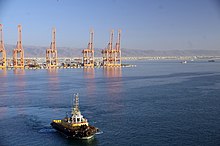Re-exportation
This articleneeds additional citations forverification.(August 2014) |

Re-exportation,also calledentrepot trade,is a form ofinternational tradein which a countryexportsgoods which it previouslyimportedwithout altering them. One such example could be when one member of afree trade agreementcharges lowertariffsto external nations to win trade, and then re-exports the same product to another partner in the trade agreement, but tariff-free. Re-exportation can be used to avoidsanctionsby other nations.
Definition of re-export
[edit]Re-exports consist of foreign goods exported in the same state as previously imported, from the free circulation area, premises for inward processing or industrial free zones, directly to the rest of the world and from premises for customs warehousing or commercial free zones, to the rest of the world.
When dealing with trade data, it is essential to subtract re-exports from normal exports to arrive at the final value of exports. This is necessary because re-exports do not undergo any value-added processes, so cannot be counted towards a nation's exports.
Examples
[edit]For example, theUnited Arab Emiratesmay have engaged in re-exportation of goods toIranas a way for Iran to avoid U.S.trade sanctionsagainst it.[1]Thus re-exportation involves export without further processing or transformation of a good that has been imported. In contrast,Finlandimported crude oil from theSoviet Unionas part of bilateral trade between these two countries and refined the oil for export to other Western European countries but this was not re-exportation because the crude oil was refined before selling. Dubaihas emerged as the major re-export center for the entireMiddle Eastregion.
